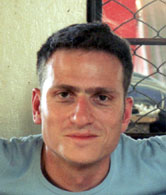When I first met Duke, he was ironing his shirt. “You gotta look clean, man! You can’t go ’round with a wrinkled shirt!” Like many homies, Duke was great at ironing. As I was to find out later, he was also handy with an AK-47.
Duke was the first gang member I met. He’d been introduced to me by a local journalist as someone who wasn’t active in the gang but could put me in touch with those who were. Duke was 30, was incredibly charismatic and funny, and had a great wife and a couple of lovely kids. He claimed he was just kicking back these days, trying to help and advise younger homies on how to make something of their lives.
I was in El Salvador to make a film about the gang epidemic that had given the country one of the highest homicide rates in the world. I wanted to understand what made these guys tick — how it was that murder had become so ordinary to many of them. I planned to do this by getting to know a group of them well, filming them for a period of six months to see what their lives were really like behind all their bravado.
Over the next few weeks, with Duke’s help, I got to know different gang members around the city. Many were barely in their teens, and they seemed rather sweet and full of charm. Were these the crazed and heartless killers I’d heard so much about?
After two months of getting to know different “clikas” — neighborhood-based sections of the gang — I settled on my characters. Duke would be central, along with some of the younger homies he hung out with in the IVU housing project in the center of San Salvador.
The crew arrived and we were ready to start filming. But things didn’t go according to plan. The very next day, Duke, who was supposed to have retired from the gang, was arrested while driving away from the scene of a shoot-out, in possession of an AK-47. So that’s what he was teaching the younger homies. One of my central characters was now in prison, yet I had to start filming. I would have to focus on some of the other gang members in the neighborhood.
Over the next few months I got to know the boys from IVU very well: their angelic-looking leader, Charlie, barely 16 years of age; Travieso, who was in tears when I first met him because his mother had sent him a birthday card from the United States; and Slappy, who, like Duke, had been brought up in the States and claimed to want to leave the gang.
Every day I would turn up with my cameraman, Neil Harvey, and sound recordist, Tim Watts, and we would just hang out, to see what happened. Most days, not much did happen — the boys smoked a lot of grass, watched TV in their squat, and watched over their territory from the “bordo,” a slightly elevated vantage point. And then suddenly, it would all kick off. They would get word that one of their comrades had been killed by their rival gang and mortal enemies, MS. Phone calls would be made, weapons would be obtained, and off they would go to avenge their friends. Wakes for their fallen comrades were so commonplace that sometimes they seemed like little more than social occasions at which to meet gang members from other parts of the city.
Over the months I was there, I would often sit around chatting with them about what they wanted from life, what they believed in, and how it could be that they could kill with such lack of remorse. What struck me most of all was how lost some of the younger boys seemed, in spite of all their bravado about the gang. Many of them had parents who lived in the United States, and for them the gang was everything: their family, their only source of companionship, and unfortunately, their moral code. When making a film, you try not to get involved, to just document what you see, but at times it’s difficult to stay completely unattached. To see 17-year-old Travieso phone his mother in the States, whom he hasn’t seen for years, telling her over and over again how much he misses her and wants to be with her, was heartbreaking. And to see him the next day spouting his gang bravado, getting ready to go on a kill, filled me with a total sense of hopelessness for his future. He seemed a boy masquerading as a man.
At times, I also felt angry about how the veterans of the gang filled the younger boys’ heads with talk that turned them into killers. I got to know many of the gang’s leaders in prison. They too could be charming, but they were hardened killers with countless murders behind them. They seemed incapable of change. Yet, it was these men who were the biggest influence on the teenagers outside — their role models and moral guides through life.
By the time I left El Salvador, having been in the country for eight months, I’d begun to see how if all around you killing is seen as normal, as a duty even, as a test of loyalty to the only family you have, then it becomes a line that’s far easier to cross than I used to think. Murder seemed to be the ultimate way of promoting gang identity and a sense of belonging. It also seemed to make life more interesting: if you are in a permanent state of war with a sworn enemy, a mundane life is made far more dramatic.
When I asked Charlie, the leader, why they kill MS, the best he could come up with was: “Because they think they’re better than we are, but they aren’t.” Boys masquerading as men.

